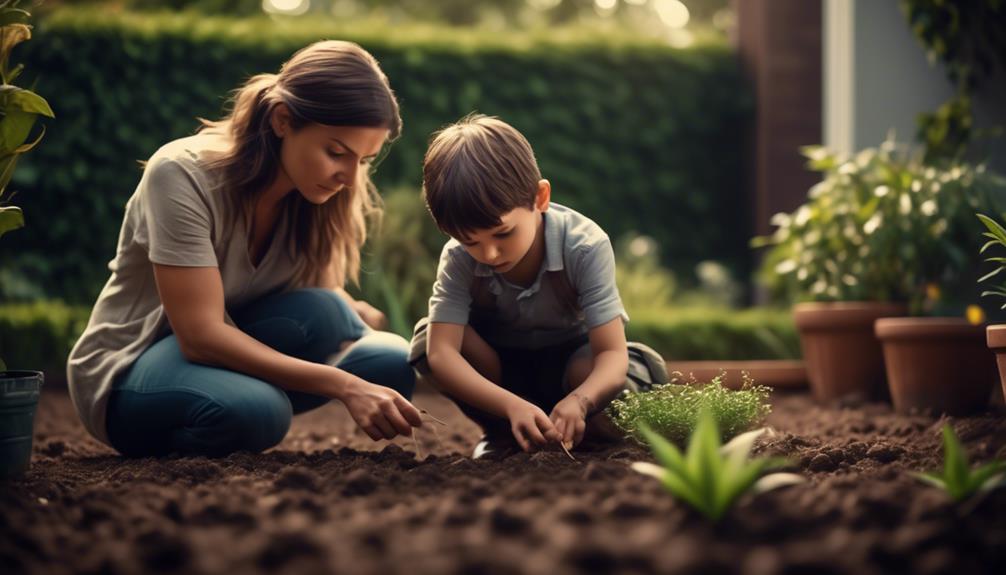Do These Things to Cultivate Patience in Parenting

Ways to cultivate patience in parenting include:
- Understanding your child's developmental stages
- Practicing self-care
- Setting realistic expectations
- Using effective communication techniques
- Implementing positive discipline strategies
- Fostering empathy and understanding
- Embracing flexibility
- Seeking support.
Understand the Developmental Stages of Your Child
Understanding the developmental stages of your child is key to fostering a patient and nurturing environment for their growth and well-being. As a parent, it's essential to recognize that children go through various stages of development, both physically and emotionally. By understanding these stages, you can provide the necessary parental guidance to support your child's growth effectively.
Children's growth occurs in stages, each with its unique characteristics and challenges. Infancy is a period of rapid physical development, where your baby learns to crawl, walk, and talk. Toddlers, on the other hand, are curious explorers, eager to assert their independence. Preschoolers are imaginative and eager to learn, while school-age children exhibit more independence and a sense of responsibility. Finally, adolescents undergo significant physical and emotional changes as they transition into adulthood.
Parental guidance plays a crucial role in each stage of your child's development. By understanding the specific needs and challenges associated with each stage, you can provide appropriate support and guidance. This includes setting boundaries, offering encouragement, and being a reliable source of love and understanding. As a parent, your role is to guide your child through these stages, nurturing their growth and helping them become confident individuals.
Practice Self-Care to Reduce Stress
To foster a patient and nurturing environment for your child's growth and well-being, it's important to prioritize self-care and reduce stress. As a parent, it's easy to get caught up in the daily demands and forget to take care of yourself. However, by incorporating self-care practices into your routine, you not only benefit your own well-being but also create a more harmonious environment for your child.
One way to reduce stress is through regular exercise. Engaging in physical activities not only helps to release tension and endorphins but also provides an opportunity for you to focus on yourself and clear your mind. Whether it's going for a run, practicing yoga, or taking a dance class, find an activity that brings you joy and make it a priority in your schedule.
Another effective technique to reduce stress is to practice mindfulness. Mindfulness involves being fully present in the moment and accepting it without judgment. By incorporating mindfulness techniques into your daily routine, such as deep breathing exercises or meditation, you can cultivate a sense of calm and create space for patience to flourish.
To summarize, prioritizing self-care and reducing stress are essential for cultivating patience in parenting. By incorporating regular exercise and practicing mindfulness techniques, you can create a more peaceful and nurturing environment for both yourself and your child. Remember, taking care of yourself isn't selfish but rather a necessary step towards becoming the best parent you can be.
Set Realistic Expectations for Yourself and Your Child
As you continue on your journey of cultivating patience in parenting, it's important to set realistic expectations for yourself and your child. Recognize that both you and your child are unique individuals with your own strengths and limitations.
It's crucial to understand that children go through various developmental stages, each with its own set of challenges and milestones. By having realistic expectations, you can avoid unnecessary frustration and disappointment.
Remember, every child is different and will progress at their own pace. Don't compare your child's progress with others or expect them to meet arbitrary standards. Instead, focus on their individual growth and celebrate their achievements, no matter how small they may seem. Encourage and support them in their journey, allowing them to explore and learn at their own pace.
Setting realistic expectations for yourself is equally important. Parenting can be demanding, and it's easy to feel overwhelmed or like you're falling short. Be kind to yourself and remember that nobody is perfect. Give yourself permission to make mistakes and learn from them. Recognize that parenting is a continuous learning process, and it's okay to ask for help when needed.
Utilize Effective Communication Techniques
When it comes to cultivating patience in parenting, one of the key aspects is utilizing effective communication techniques.
Active listening skills play a crucial role in understanding your child's needs and emotions.
By being clear and concise in your communication, you can avoid misunderstandings and foster a stronger connection.
Additionally, showing empathy and understanding can create a safe and supportive space for your child to express themselves.
Active Listening Skills
Developing active listening skills is essential for effective communication in parenting. As a parent, it's crucial to truly listen to your child, not just hear their words. Active listening techniques, such as maintaining eye contact, nodding, and responding with empathy, allow you to show your child that you value their thoughts and feelings.
By actively listening, you create a safe space for them to express themselves and strengthen the parent-child bond. Effective communication strategies involve giving your full attention, refraining from interrupting, and asking open-ended questions to encourage further discussion.
It's important to remember that active listening isn't about finding solutions or giving advice, but rather about understanding and validating your child's experiences. By honing your active listening skills, you can foster open and meaningful conversations with your child, helping them feel heard and supported.
Clear and Concise
To effectively communicate with your child, it's important to utilize clear and concise communication techniques that promote understanding and mutual respect. When speaking to your child, choose your words carefully and aim to be direct and straightforward. Avoid using complex or ambiguous language that may confuse or overwhelm them.
Being clear and concise in your communication not only helps your child understand your expectations and instructions but also teaches them the importance of effective communication. Additionally, clear and concise communication can help in developing resilience and managing frustration. By clearly expressing your thoughts and emotions, you're providing your child with a model for expressing themselves in a healthy manner.
Empathy and Understanding
Have you ever considered how utilizing effective communication techniques can cultivate empathy and understanding in parenting? When it comes to fostering empathy and patience, building resilience is key.
Here are three ways that effective communication can help you cultivate empathy and understanding in your parenting journey:
- Active listening: By truly listening to your child's thoughts, feelings, and experiences without judgment or interruption, you show them that their voice matters. This helps them feel understood and validated, fostering a deeper connection between you.
- Reflective questioning: Asking open-ended questions encourages your child to think and express themselves more deeply. It also shows that you're interested in their perspective and willing to engage in meaningful conversations.
- Non-verbal cues: Pay attention to your body language, tone of voice, and facial expressions. These non-verbal cues can communicate empathy and understanding more effectively than words alone. Maintaining eye contact, nodding, and using a calm and gentle tone can create a safe and supportive environment for your child to open up.
Implement Positive Discipline Strategies
When implementing positive discipline strategies, it's important to approach the situation with calmness and wisdom, fostering a peaceful environment for both you and your child. Positive discipline focuses on guiding and teaching children rather than punishing them. It involves using techniques that encourage positive behavior while setting consistent boundaries. This approach promotes a loving and respectful relationship between you and your child.
One effective strategy is positive reinforcement, which involves acknowledging and praising your child's good behavior. This not only boosts their self-esteem but also encourages them to continue behaving positively. It's important to be specific when giving praise, highlighting the particular behavior you appreciate.
Another crucial aspect of positive discipline is setting consistent boundaries. Children need clear expectations and rules. Establishing consistent boundaries helps them understand what's expected of them and provides them with a sense of security. Consistency also means following through with consequences when boundaries are crossed, as this helps children understand the consequences of their actions.
Foster Empathy and Understanding in Your Parenting Approach
As we continue our journey of cultivating patience in parenting, let's now explore the importance of fostering empathy and understanding in our approach.
Empathy is the ability to understand and share the feelings of another, while understanding developmental stages allows us to meet our children where they're at. By incorporating these two elements into our parenting, we can create a safe and nurturing environment for our children to grow and thrive.
Here are three ways to foster empathy and understanding in your parenting approach:
- Practice active listening: Pay attention to your child's verbal and nonverbal cues. Show genuine interest in what they've to say and validate their feelings. By actively listening, you're sending the message that their thoughts and emotions matter.
- Put yourself in their shoes: Try to see things from your child's perspective. Understanding their developmental stage will help you respond with empathy and patience. Remember, they're still learning and growing, and it's our role to guide them through this process.
- Teach empathy through example: Model empathy in your everyday interactions. Show compassion and kindness towards others, and encourage your child to do the same. By demonstrating empathy, you're teaching them an invaluable life skill that will serve them well in their relationships.
Embrace Flexibility and Adaptability in Your Parenting Style
As a parent, it's important to cultivate an open-minded approach that embraces change gracefully.
Parenting is a journey filled with unexpected twists and turns, and being flexible and adaptable is key to navigating these challenges.
Open-Minded Parenting Approach
Embracing flexibility and adaptability in your parenting style allows for a harmonious and fulfilling journey of growth with your child. By adopting an open-minded parenting approach, you create an environment where patience and understanding thrive. Here are three key ways to cultivate this mindset:
- Practice active listening: Take the time to truly listen to your child's thoughts, feelings, and concerns. Show empathy and validate their experiences, even if they differ from your own. This helps build trust and strengthens your bond.
- Embrace different perspectives: Recognize that there's no one-size-fits-all approach to parenting. Stay open to new ideas and be willing to adjust your strategies when necessary. This allows you to adapt to your child's unique needs and helps foster a sense of mutual respect.
- Foster a growth mindset: Encourage your child to embrace challenges and view setbacks as opportunities for growth. Model resilience and demonstrate that it's okay to make mistakes. This instills a sense of patience and understanding, allowing both you and your child to learn and grow together.
Embracing Change Gracefully
Flexibility and adaptability are essential qualities to cultivate in your parenting style, allowing you to gracefully embrace change as you navigate the ever-evolving journey of raising a child. Parenting is a constant series of adjustments and transitions, and being able to adjust your expectations with graceful acceptance is key. It is important to recognize that your child is growing, changing, and developing their own unique personality and needs. Embracing change gracefully means letting go of rigid expectations and adapting your parenting approach to suit the evolving needs of your child. By being open to change, you create a nurturing and supportive environment that allows your child to thrive. Remember, adjusting expectations doesn't mean compromising on your values or standards, but rather finding a balance between structure and flexibility that promotes growth and happiness for both you and your child.
| Benefits of Embracing Change Gracefully | How to Cultivate Graceful Acceptance |
|---|---|
| Reduces stress and frustration | Practice mindfulness and self-reflection |
| Strengthens your bond with your child | Keep an open mind and be willing to learn |
| Allows for greater personal growth | Seek support from fellow parents or professionals |
| Encourages resilience and adaptability in your child | Emphasize communication and understanding |
| Creates a positive and harmonious household | Embrace the beauty of imperfection |
Seek Support From Other Parents and Professionals
One way to cultivate patience in parenting is by seeking support from fellow parents and professionals, who can offer valuable insights and guidance along your journey. Parenting is undoubtedly filled with challenges, and it's during these moments that you may feel overwhelmed and in need of assistance. Remember, seeking support doesn't mean you're weak or incapable; rather, it shows strength and a commitment to growth.
Here are three reasons why seeking support from other parents and professionals is essential:
- Shared experiences: Other parents have likely faced similar challenges and can empathize with your struggles. By sharing your experiences and listening to theirs, you can gain new perspectives and realize that you aren't alone in your journey. This sense of camaraderie can provide comfort and reassurance.
- Insights and guidance: Professionals, such as therapists or parenting coaches, have specialized knowledge and expertise in child development and behavior. Their insights and guidance can help you navigate difficult situations with patience and understanding. They can offer practical strategies and techniques tailored to your specific circumstances.
- Self-reflection: Interacting with other parents and professionals encourages self-reflection. Through discussions and conversations, you can gain insights into your own parenting style and identify areas for growth. This self-awareness allows you to make conscious choices and develop patience as you learn and adapt to the unique needs of your child.
Frequently Asked Questions
How Can I Handle My Child's Tantrums and Meltdowns Effectively?
When your child has tantrums or meltdowns, it can be challenging. Remember to stay calm and patient, and try to understand their emotions. Show empathy and help them regulate their emotions through gentle guidance and reassurance.
What Are Some Effective Strategies to Encourage Positive Behavior in My Child?
To encourage positive behavior in your child, use positive reinforcement and set clear expectations. Recognize and praise their efforts when they behave well, and calmly address any misbehavior. Consistency and patience are key.
How Can I Create a Nurturing and Supportive Environment for My Child?
How can you create a nurturing and supportive environment for your child? By creating healthy boundaries, you provide structure and stability. Building a strong emotional connection through active listening and empathy fosters trust and growth.
How Do I Deal With My Own Feelings of Frustration and Impatience as a Parent?
To deal with your own frustration and impatience as a parent, start by practicing mindfulness techniques. Take deep breaths, pause before reacting, and remind yourself to stay present. Seek support from other parents who understand your journey.
What Are Some Tips for Effectively Communicating With My Child and Resolving Conflicts Peacefully?
To effectively communicate with your child and resolve conflicts peacefully, practice the art of effective listening. Hear their words, understand their emotions, and respond with empathy. Set clear boundaries with love and patience, guiding them towards growth and understanding.










